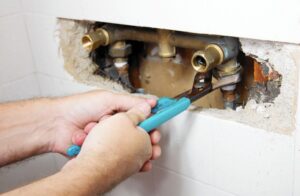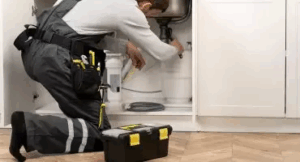As a homeowner, you may focus on maintaining your roof, windows, or even the exterior of your property, but there is one critical aspect that often goes unnoticed: the plumbing system. Regular plumbing maintenance plays a pivotal role in enhancing the longevity of your home. Often, we take the plumbing system for granted, only noticing issues when a problem arises. However, addressing minor issues before they become major problems can save you both money and stress in the long run. In this blog post, we will discuss how regular plumbing maintenance increases your home’s longevity, how it can prevent costly repairs, and the key benefits that come with ensuring your plumbing system is always in optimal condition.
Understanding the Importance of Regular Plumbing Maintenance
 Plumbing maintenance is not just about fixing leaks or unclogging drains. It encompasses everything from inspecting your pipes, fixtures, and water heater to ensuring that your system is working efficiently and effectively. Much like maintaining a car, a well-maintained plumbing system operates smoothly, prevents sudden breakdowns, and extends its lifespan. Neglecting regular maintenance can lead to larger, more expensive issues down the road, such as pipe bursts, water damage, and high water bills.
Plumbing maintenance is not just about fixing leaks or unclogging drains. It encompasses everything from inspecting your pipes, fixtures, and water heater to ensuring that your system is working efficiently and effectively. Much like maintaining a car, a well-maintained plumbing system operates smoothly, prevents sudden breakdowns, and extends its lifespan. Neglecting regular maintenance can lead to larger, more expensive issues down the road, such as pipe bursts, water damage, and high water bills.
By addressing plumbing issues early on, you can ensure that your home functions properly without unexpected disruptions. Routine maintenance also minimizes the risk of major plumbing emergencies that could damage your property and put a significant strain on your finances. By investing in regular plumbing check-ups, you essentially protect your home from unforeseen damage and maintain its overall value.
Preventing Water Damage Through Routine Inspections
Water damage is one of the most significant threats to a home’s structure and value. Plumbing systems are an integral part of your home, running through walls, ceilings, floors, and even beneath your foundation. Over time, pipes can corrode, develop leaks, or become clogged, leading to water pooling inside walls or floors. If not addressed promptly, this can lead to mold growth, rotting wood, and weakening of the foundation.
Routine plumbing maintenance allows professionals to inspect your pipes for any signs of wear and tear, preventing leaks from becoming more severe. Catching these problems early ensures that minor issues like a slow drip from a pipe or a small leak under the sink don’t progress into more significant concerns that require expensive repairs. By preventing water damage, regular maintenance helps preserve the structural integrity of your home and keeps your living spaces dry and safe.
Extending the Lifespan of Plumbing Fixtures and Appliances
Another way regular plumbing maintenance contributes to the longevity of your home is by extending the lifespan of plumbing fixtures and appliances. Your water heater, washing machine, dishwasher, and refrigerator all rely on the plumbing system to function properly. Over time, mineral deposits, sediment buildup, and corrosion can negatively affect these appliances, causing them to work less efficiently or even fail entirely.
For example, water heaters can develop sediment buildup in the tank, which reduces their efficiency and leads to higher energy bills. Regular maintenance of your water heater, including draining the tank and checking for any signs of rust or leaks, helps ensure that the appliance operates at optimal efficiency. Similarly, checking the hoses, valves, and connections of other appliances can prevent unnecessary wear and tear, avoiding costly replacements and repairs.
By regularly maintaining plumbing fixtures and appliances, you increase their lifespan and, in turn, prevent the need for expensive replacements, saving you money and reducing the hassle of dealing with emergency breakdowns.
Ensuring Efficient Water Flow and Reducing Clogs
A well-functioning plumbing system ensures that water flows smoothly through your pipes, faucets, and drains. Over time, however, debris, hair, soap scum, and grease can accumulate inside your drains, leading to clogs and slow water flow. This not only affects the performance of your plumbing but can also cause pressure buildup in pipes, increasing the risk of pipe bursts.
Regular plumbing maintenance includes clearing your drains, checking for blockages, and ensuring proper water flow throughout your home. A professional plumber will inspect your drains for any signs of buildup or potential obstructions, using tools such as drain snakes or hydro-jetting to remove debris before it causes a major issue. This preventative care can help avoid clogs that would otherwise disrupt your daily routine and cause costly damage to your plumbing system.
Moreover, maintaining good water flow can enhance the overall efficiency of your home’s plumbing system. With fewer obstructions and more efficient water movement, your system works better, requiring less energy and water to function.
Avoiding Emergency Plumbing Situations
Emergencies rarely happen at convenient times. A burst pipe, a malfunctioning water heater, or a sudden blockage can cause significant damage to your home if not dealt with immediately. Emergency plumbing situations can result in costly repairs, water damage, and a lot of stress.
 Regular plumbing maintenance minimizes the likelihood of such emergencies occurring. By identifying potential issues before they become urgent, plumbers can address small problems before they escalate. Regular inspections allow for proactive solutions, such as replacing a deteriorating pipe before it bursts or fixing a small leak before it causes extensive damage to walls or ceilings.
Regular plumbing maintenance minimizes the likelihood of such emergencies occurring. By identifying potential issues before they become urgent, plumbers can address small problems before they escalate. Regular inspections allow for proactive solutions, such as replacing a deteriorating pipe before it bursts or fixing a small leak before it causes extensive damage to walls or ceilings.
Preventative plumbing maintenance offers peace of mind, knowing that your home is protected from sudden plumbing failures and emergencies. The cost of regular maintenance is often far less than the financial strain of dealing with a plumbing crisis.
Maintaining Water Efficiency and Saving on Bills
One often-overlooked benefit of plumbing maintenance is its impact on water efficiency. Leaky faucets, running toilets, and inefficient appliances all contribute to water wastage, which leads to higher utility bills. A leaky faucet may seem like a minor inconvenience, but over time, the water wasted adds up, both in cost and environmental impact.
Through regular plumbing maintenance, leaks are quickly identified and repaired, and appliances are checked for optimal water efficiency. This can involve inspecting faucets, pipes, and toilets to ensure there are no leaks, replacing worn-out washers or seals, and ensuring that your appliances are running efficiently. With these measures, you can reduce water consumption, lower your water bills, and contribute to environmental conservation by using less water overall.
The Long-Term Financial Benefits
While regular plumbing maintenance does come with a cost, the long-term financial benefits far outweigh the expense. Investing in routine checks and minor repairs prevents the need for expensive plumbing emergencies, costly appliance replacements, and extensive water damage repairs. Additionally, maintaining your plumbing system can boost your home’s resale value. Prospective buyers are often more inclined to invest in a home with a well-maintained plumbing system, as it assures them that there won’t be hidden issues lurking beneath the surface.